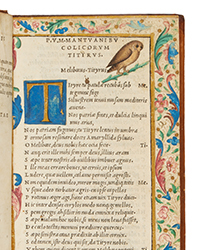Rare Book Monthly
Book Catalogue Reviews - December - 2006 Issue
For Boston from the Antiquariaat Forum
By Michael Stillman
The Antiquariaat Forum of Utrecht, the Netherlands, published a pamphlet of items for the recent Boston International Antiquarian Book Fair. The Antiquariaat Forum is a regular participant at major book fairs around the world, and generally prints up small catalogues of material they exhibit. Naturally, there is no requirement that the items be purchased at the fair, so anything in the listings still available is fair game for other buyers. Here are a few of the items they displayed in Boston.
Bianca Cappello was born of one of Venice's wealthiest and most influential families of the 16th century. However, she forsook it all for the hand of a poor young clerk from Florence in 1563. They settled down, had a daughter, and were poor but happy. It has all the makings of a Disney story. Not so fast. Ms. Cappello was a beauteous woman, and perhaps all that poverty for love was not quite so appealing after all. She caught the eye of young Francesco de Medici, son of the Grand Duke of Tuscany, and a high living son of privilege and power, typical of his infamous family. He seduced Ms. Cappello, while buying off her husband with a court job and women of his own. The husband was murdered on the street in 1572. Francesco already had a wife at the time, but this was not an impediment for the Medicis. His wife Joan was the ugly daughter of the Holy Roman Emperor, married for her connections. When the sickly Joan died, Francesco married his longtime mistress. Item 20, Feste nelle nozze del serenissimo don Francesco Medici gran duca di Toscano, celebrates the coronation of Duchess Bianca in 1579. They would spend eight years together before dying a day apart in 1587, with historians debating whether their deaths resulted from malaria, or poisoning, intentional or accidental. Priced at $63,450.
Charles Chauncy was one of America's most influential 18th century preachers. During the period of the Great Awakening, spurred on by Jonathan Edwards, Chauncy found himself on the other side. Chauncy's was a calmer, more reason based religion than the emotional sects forming during the era. He would lead the First Church in Boston for six decades, from 1727 until he died in 1787. However, he would also oppose the influence of the Anglican Church, being a supporter of America's revolution. Item 11 is a Chauncy sermon from 1737, Prayer for help, a seasonable duty upon the Ceasing of Godly and Faithful men. $760.









